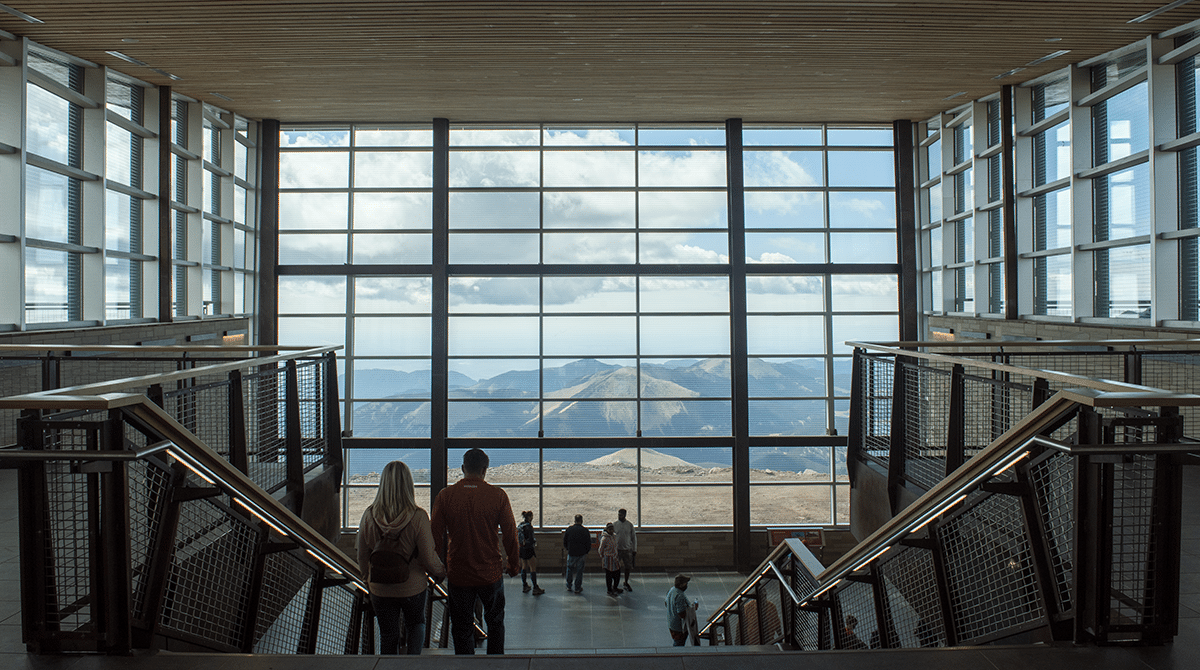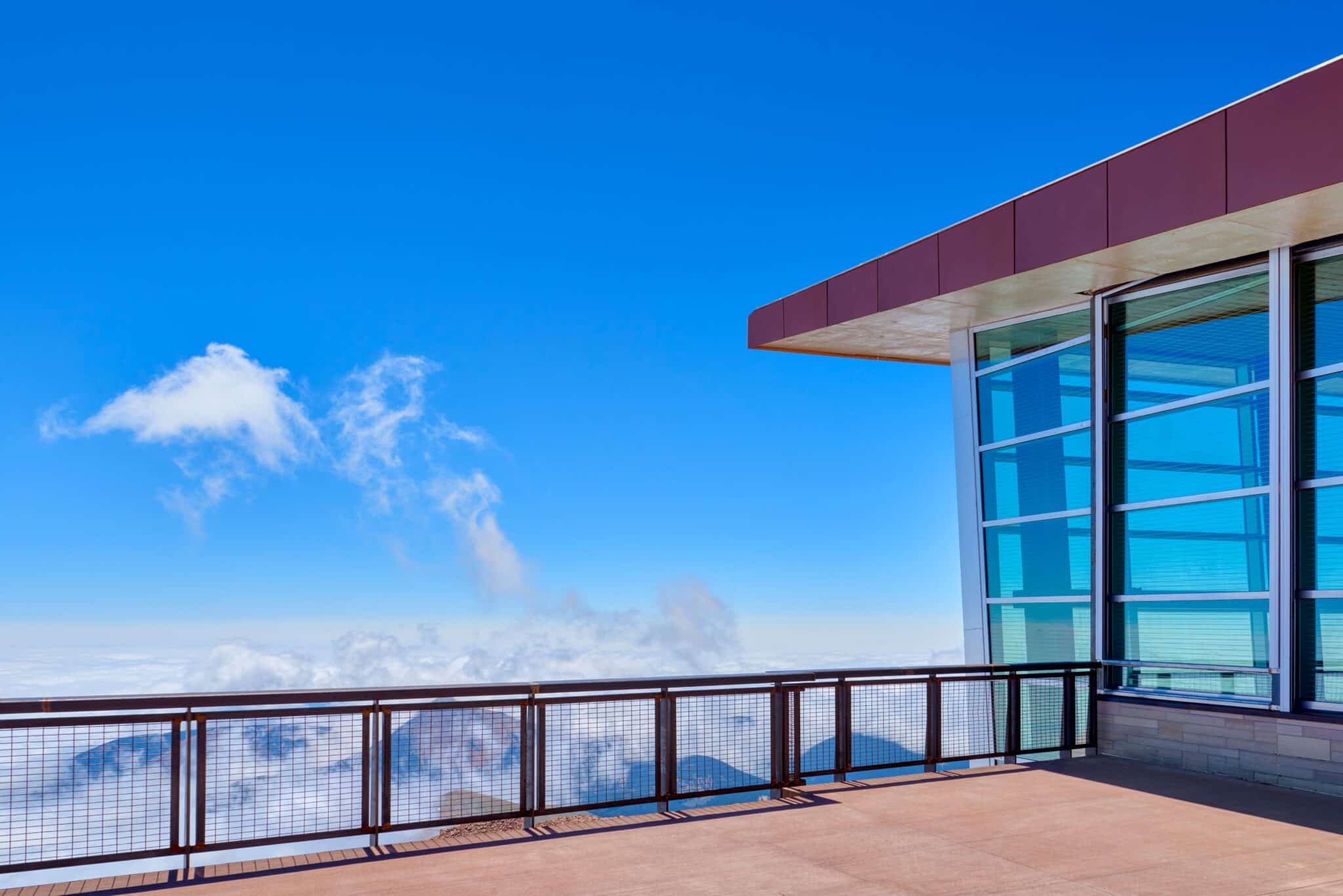
The Pikes Peak Summit Visitor Center at 14,115 feet includes indoor and outdoor exhibits, walkways and popular donuts. (City of Colorado Springs)
The company that built a new visitor center atop Pikes Peak says Colorado Springs refuses to reimburse it for work delays that were caused by the city’s slowness and the pandemic.
GE Johnson, which is based in Colorado Springs and also built the U.S. Olympic Committee headquarters there, sued the city on Wednesday in El Paso County District Court.
In December 2015, GE Johnson was chosen by the city to bulldoze the existing summit house on Pikes Peak and build a visitor center at 14,115 feet. It was to be paid $60 million.
Because of the challenges of building on a summit, the city and GE Johnson agreed work would be done only between late May and September, the company says. So, when work was to begin in 2018, GE Johnson wanted to start early in the season but couldn’t start until August.
For that it blames Colorado Springs. The city took nine weeks longer than expected to reach an agreement with the U.S. Forest Service over permits, according to GE Johnson. From that delay flowed a cascade of delays that eventually pushed completion back from 2020 to 2021.
The 120-day build season in 2018 was cut to 56 days, which led GE Johnson employees to work overtime and into the winter. Then blasting work took 79 days rather than the estimated 20 due to unexpected permafrost and ground water at the site. That pushed back excavation work, which also took longer than anticipated due to unexpected conditions at the site.

The visitor center atop Pikes Peak opened in mid-2021 after three years of work that was led by GE Johnson. (City of Colorado Springs)
Then came COVID. More vehicles were needed to keep employees isolated, equipment had to be sanitized often, symptomatic and COVID-positive employees had to quarantine, and labor productivity dropped by at least 10 percent, according to GE Johnson’s lawsuit.
The company is suing because, it claims, it hasn’t been paid for the extra work that COVID and the city’s delays forced it to take on. GE Johnson said its contract with Colorado Springs requires the city to pay it for expenses related to delays that were not GE Johnson’s fault.
The lawsuit doesn’t say how much money GE Johnson believes it is owed and its lawyers declined to answer that question Thursday.
Vanessa Zink, a spokeswoman for the city, also declined to comment on the litigation.
The visitor center opened in mid-2021. In a statement Thursday, GE Johnson said it is “proud of our work on the Pikes Peak Summit Complex project, which has received widespread acclaim for the outstanding achievements in construction that made its completion possible.”
“Despite having invested considerable time and effort, GE Johnson and the City of Colorado Springs have thus far been unable to resolve certain disputes that arose on the project. We remain committed to seeking a fair resolution to those disputes,” it said.
GE Johnson is represented in the case by attorneys Jeffrey George, Joseph Lambert and David Willner with the Colorado Springs office of Hogan Lovells, an international firm.

The Pikes Peak Summit Visitor Center at 14,115 feet includes indoor and outdoor exhibits, walkways and popular donuts. (City of Colorado Springs)
The company that built a new visitor center atop Pikes Peak says Colorado Springs refuses to reimburse it for work delays that were caused by the city’s slowness and the pandemic.
GE Johnson, which is based in Colorado Springs and also built the U.S. Olympic Committee headquarters there, sued the city on Wednesday in El Paso County District Court.
In December 2015, GE Johnson was chosen by the city to bulldoze the existing summit house on Pikes Peak and build a visitor center at 14,115 feet. It was to be paid $60 million.
Because of the challenges of building on a summit, the city and GE Johnson agreed work would be done only between late May and September, the company says. So, when work was to begin in 2018, GE Johnson wanted to start early in the season but couldn’t start until August.
For that it blames Colorado Springs. The city took nine weeks longer than expected to reach an agreement with the U.S. Forest Service over permits, according to GE Johnson. From that delay flowed a cascade of delays that eventually pushed completion back from 2020 to 2021.
The 120-day build season in 2018 was cut to 56 days, which led GE Johnson employees to work overtime and into the winter. Then blasting work took 79 days rather than the estimated 20 due to unexpected permafrost and ground water at the site. That pushed back excavation work, which also took longer than anticipated due to unexpected conditions at the site.

The visitor center atop Pikes Peak opened in mid-2021 after three years of work that was led by GE Johnson. (City of Colorado Springs)
Then came COVID. More vehicles were needed to keep employees isolated, equipment had to be sanitized often, symptomatic and COVID-positive employees had to quarantine, and labor productivity dropped by at least 10 percent, according to GE Johnson’s lawsuit.
The company is suing because, it claims, it hasn’t been paid for the extra work that COVID and the city’s delays forced it to take on. GE Johnson said its contract with Colorado Springs requires the city to pay it for expenses related to delays that were not GE Johnson’s fault.
The lawsuit doesn’t say how much money GE Johnson believes it is owed and its lawyers declined to answer that question Thursday.
Vanessa Zink, a spokeswoman for the city, also declined to comment on the litigation.
The visitor center opened in mid-2021. In a statement Thursday, GE Johnson said it is “proud of our work on the Pikes Peak Summit Complex project, which has received widespread acclaim for the outstanding achievements in construction that made its completion possible.”
“Despite having invested considerable time and effort, GE Johnson and the City of Colorado Springs have thus far been unable to resolve certain disputes that arose on the project. We remain committed to seeking a fair resolution to those disputes,” it said.
GE Johnson is represented in the case by attorneys Jeffrey George, Joseph Lambert and David Willner with the Colorado Springs office of Hogan Lovells, an international firm.


